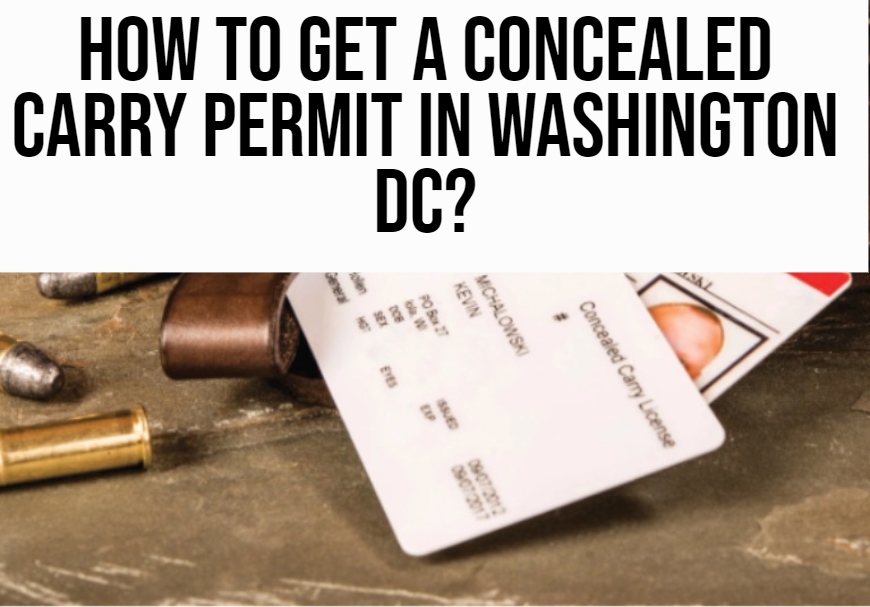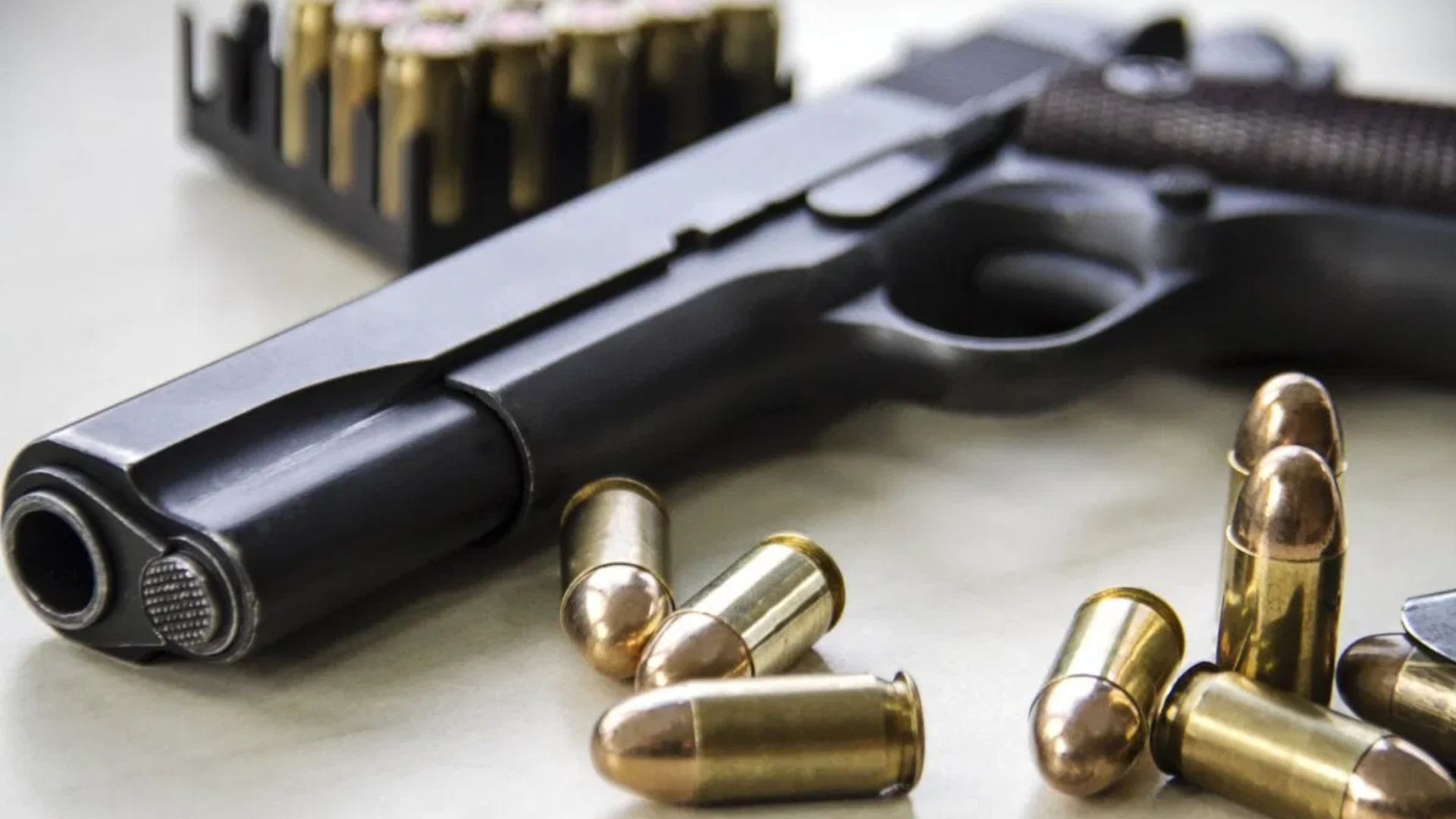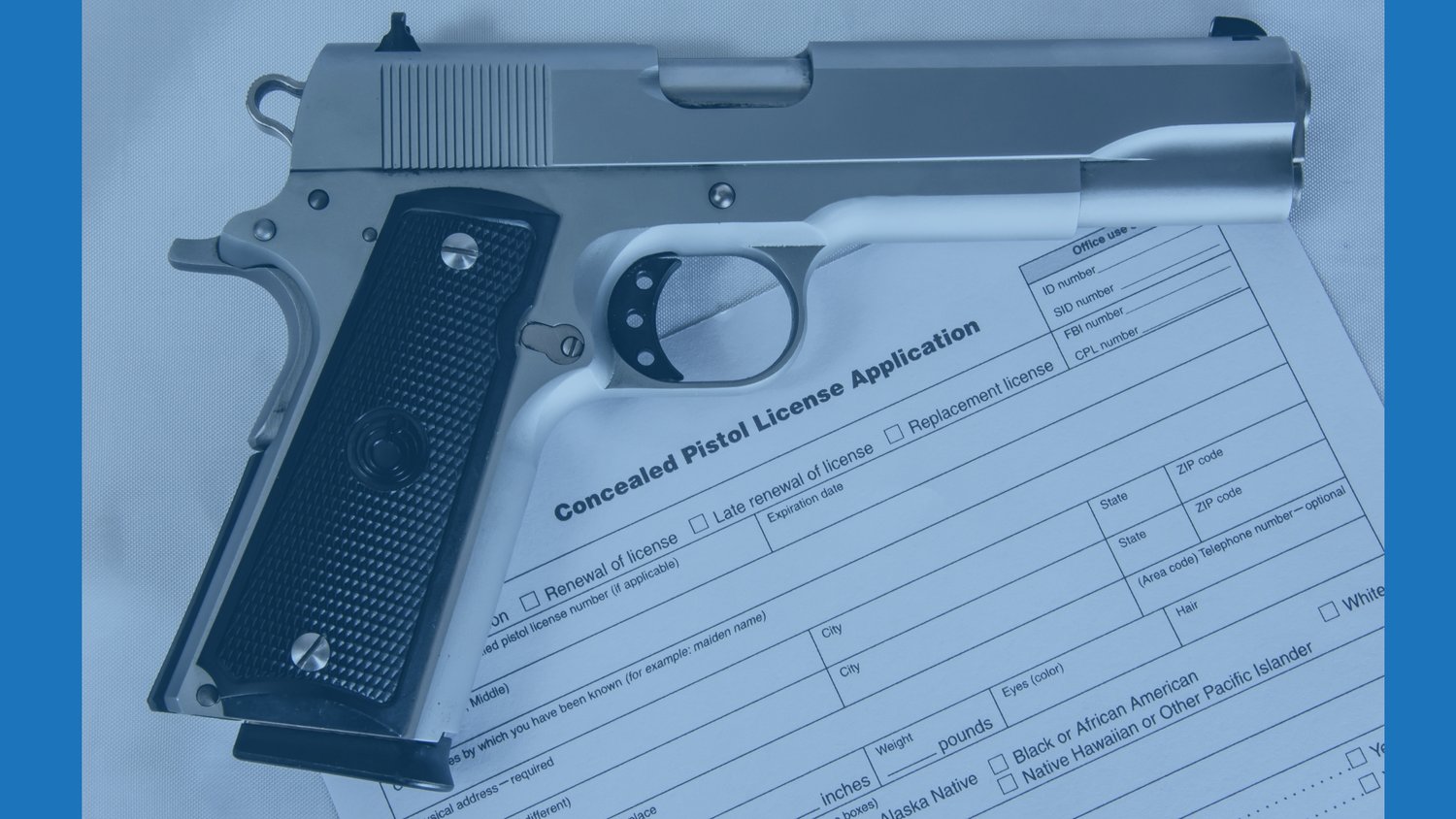How To Get A Concealed Carry Permit In Washington DC?
Discover the process of how to get a concealed carry permit in Washington DC. Learn about eligibility, responsibilities, and restrictions to ensure responsible firearm ownership in the nation's capital.
Author:Paolo ReynaReviewer:James PierceNov 09, 202325.8K Shares379.7K Views

Obtaining a concealed carry permit in Washington, D.C., involves a specific and regulated process due to the district's stringent gun control laws. To legally carry a concealed firearm within the nation's capital, individuals must adhere to a well-defined set of rules and requirements. So, how to get a concealed carry permit in Washington DC?
In this comprehensive guide, we will delve into the step-by-step process on how to get a concealed carry permit in Washington DC.
You must have a valid license and register any firearms you own because the District of Columbia continues to maintain tight gun rules. It is a felony in the District of Columbia to possess a firearm without a Concealed Carry Pistol License (CCPL), and the potential punishment is up to five years in prison and/or a $12,500 fine. A permit from another state will not be accepted since D.C. has no reciprocity agreements with any other states.
The District of Columbia outlawed openly carrying concealed pistols until 2014. 2009 saw the elimination of District of Columbia Code Ann. 22-4506, which described the prerequisites for a handgun permit. As a result, the Chief of Police lacked the power to grant a permit for carrying. In Palmer v. District of Columbia, 59 F. Supp. 3d 173 (D.D.C. 2014), a federal court invalidated the District's policy of withholding permits to carry.
Before 2017, applicants in the District had to demonstrate a "good reason" to fear harm to their person or property in order to be granted a concealed carry permit. A federal appeals court invalidated that provision in Wrenn v. District of Columbia, 864 F.3d 650 (D.C. Cir. 2017). Instead of appealing the Wrenn ruling3, the District decided to stop enforcing the "good reason" stipulation.4
It is crucial that you are familiar with all current rules and regulations in this state before applying for a Washington, D.C. license to carry a handgun. Any rules or requirements of another state are not superseded by a Washington, D.C. license.
Understanding The Legal Landscape - Washington, D.C. Gun Laws
Obtaining a concealed carry permit in Washington, D.C., is a complex process primarily due to the district's stringent gun control laws. These laws aim to maintain a high level of safety and control over the ownership and carrying of firearms within the district. Before delving into the step-by-step process of obtaining a concealed carry permit, it's crucial to have a comprehensive understanding of the legal landscape governing firearms in the nation's capital.
May-Issue Jurisdiction
Washington, D.C. operates as a "may-issue" jurisdiction when it comes to concealed carry permits. In a "may-issue" jurisdiction, the granting of permits is subject to the discretion of a designated authority, often the Chief of Police. This means that individuals applying for concealed carry permits must meet specific criteria and demonstrate a valid reason for carrying a concealed firearm, and even then, issuance is not guaranteed.
Firearm Registration
One of the cornerstones of Washington, D.C.'s gun laws is firearm registration. All handguns must be registered with the Metropolitan Police Department. The purpose of this registration is to create a record of all legally owned firearms within the district, enabling law enforcement to trace firearms, should the need arise.
Assault Weapon Ban
Washington, D.C. has a ban on the possession of assault weapons. The definition of what constitutes an assault weapon is spelled out in the law and includes certain semi-automatic rifles and pistols with specific features. This ban aims to limit the presence of military-style firearms within the district.
Waiting Periods
Firearm purchasers in Washington, D.C. are subject to a mandatory ten-day waiting period before they can take possession of the purchased firearm. This waiting period allows law enforcement to conduct background checks and review the purchaser's eligibility.
Private Sale Restrictions
The district also imposes restrictions on private sales of firearms. In Washington, D.C., all firearm transfers, even those between private parties, must go through a federally licensed firearms dealer, who conducts background checks on the transferee.
Prohibited Possessors
Washington, D.C. law designates certain individuals as prohibited possessors, making it illegal for them to own or possess firearms. These individuals include those convicted of felonies, individuals subject to restraining orders, and those with certain mental health disqualifications.
Requirements For Concealed Carry Permit In D.C.
Understanding the legal landscape of firearm ownership in Washington, D.C., is essential, but equally important is grasping the basic eligibility requirements for obtaining a concealed carry permit within this jurisdiction. The district's strict gun control laws extend to the permit application process, where applicants must meet several criteria to be considered eligible.
Residency
Candidates obtaining concealed carry permits in the District must reside or have employment there. A valid concealed carry permit from another state must be held by the applicant if they do not reside or work in the District of Columbia. If a candidate fits the requirements for a District resident and lives in a state that does not provide concealed carry permits, the candidate may apply for a permit;
Age
Applicants must be at least 21 years old to be considered for a concealed carry permit. This age requirement aligns with the legal age for purchasing and possessing handguns in the district.
Mental Competency
One of the critical eligibility requirements pertains to mental competency. You must not have been adjudicated mentally incompetent or committed to a mental institution. This requirement reflects the district's commitment to ensuring that concealed carry permit holders are mentally stable and fit to carry firearms.
Criminal Record
Applicants for concealed carry permits in Washington, D.C., must not have felony convictions on their record. Additionally, convictions for specific misdemeanors may also disqualify individuals from obtaining a permit. The specifics of these disqualifying misdemeanors are outlined in the district's gun laws.
Restraining Orders
Individuals subject to restraining orders may be ineligible for a concealed carry permit. These orders are often issued in cases of domestic violence or harassment and indicate a potential risk that may disqualify the subject from carrying a concealed weapon.
Washington, D.C. Concealed Carry Permit Application Process
Securing a concealed carry permit in Washington, D.C., involves a comprehensive application process that is designed to ensure safety and control over the carrying of firearms within the district. The stringent gun laws and the "may-issue" nature of the jurisdiction make the application process complex and thorough. In this section, we will break down the various steps involved in obtaining a concealed carry permit in the nation's capital.
Completion Of A Firearms Training Course
The journey towards obtaining a concealed carry permit in Washington, D.C., begins with education. Prospective applicants must complete a certified Firearms Training Course conducted by a qualified instructor. This course imparts essential knowledge about firearm safety, marksmanship, and the legal responsibilities associated with carrying a concealed weapon.
Obtaining The Application
Once you've successfully completed the required Firearms Training Course, you can obtain a concealed carry permit application from the Metropolitan Police Department's Firearms Registration Section. This application will serve as your primary document for the application process.
Detailed Application Completion
The application is a critical component of the process, and it's imperative that you complete it meticulously and thoroughly. The application will ask for various personal details and will require you to provide supporting documentation, including proof of residency and other essential paperwork. Incomplete or inaccurate applications can lead to delays or even denials.
Fingerprinting And Background Check
After you've submitted your application, the next step involves undergoing fingerprinting. The fingerprinting process is essential as it is used to conduct an extensive background check. During this check, your criminal history and mental health records will be carefully scrutinized to determine your eligibility.
Criminal History And Mental Health Records Review
One of the most critical steps in the application process is the review of your criminal history and mental health records. This thorough examination helps the authorities assess your eligibility for a concealed carry permit. Any disqualifying factors that arise during this review may result in the denial of your application.
In-Person Interview
Applicants may be called in for an in-person interview at the discretion of the Chief of Police. The purpose of this interview is to assess the applicant's suitability to carry a concealed weapon. It is crucial to be honest and forthright during this interview, as dishonesty can negatively impact your application.
Paying The Application Fee
The application process requires payment of a non-refundable application fee. This fee covers the costs associated with processing your application, including conducting background checks and other administrative expenses. It is crucial to check the most up-to-date fee amount, as it may change over time.
Attending A Concealed Carry Board Meeting (if Necessary)
In Washington, D.C., a Concealed Carry Licensing Review Board periodically convenes to review applications and make determinations. Attending this meeting may be required in some cases and provides applicants with the opportunity to present their case for obtaining a concealed carry permit. It is important to be prepared and present your case effectively during this step of the process.
Notification Of Approval Or Denial
After your application has undergone thorough review, you will receive a formal notification of either approval or denial. If your application is approved, you will be issued a concealed carry permit. If it is denied, the notification will include the reason for the denial, allowing you to understand the grounds for the decision.
Responsibilities And Restrictions
Securing a concealed carry permit in Washington, D.C., is not just about meeting eligibility requirements and navigating the application process; it also involves an ongoing commitment to specific responsibilities and adherence to stringent restrictions.
The district's concealed carry laws are designed to ensure safety and control over the carrying of firearms, and permit holders are expected to act responsibly and within the bounds of the law. In this section, we will explore the responsibilities and restrictions that come with being a concealed carry permit holder in the nation's capital.
Firearm Registration
One of the primary responsibilities of a concealed carry permit holder in Washington, D.C., is the proper registration of firearms. All handguns must be registered with the Metropolitan Police Department. This registration process creates a comprehensive record of legally owned firearms within the district and allows law enforcement to trace firearms if necessary. It is essential to ensure that your registered firearms are compliant with the district's laws and regulations.
Recertification
Concealed carry permit holders in Washington, D.C., are often required to undergo recertification. Recertification is a process by which permit holders reaffirm their eligibility and provide evidence of their continued need to carry a concealed firearm. This process ensures that permit holders remain in compliance with the law and that they continue to meet the district's criteria for carrying a concealed weapon. Failing to recertify can result in the revocation of the permit.
Compliance With Restricted Areas
Even with a concealed carry permit, there are specific places where carrying a concealed weapon is prohibited within Washington, D.C. These restrictions are in place to maintain safety and security in sensitive areas. Restricted areas may include government buildings, public transportation, schools, and other places where firearms could pose a heightened risk. Permit holders are expected to be aware of these restrictions and to strictly comply with them. Failure to do so can result in legal consequences.
Duty To Inform Law Enforcement
If you are stopped by law enforcement, it is generally your duty as a concealed carry permit holder to inform the officer that you have a concealed carry permit and are carrying a concealed weapon. This duty to inform is essential for transparency during encounters with law enforcement. It allows officers to be aware of the presence of a firearm and to take appropriate precautions during the interaction. Failing to inform law enforcement as required by law can lead to legal complications.
Use Of Force And Self-Defense
Understanding the permissible use of force, including self-defense, is a fundamental aspect of responsible concealed carry. Carrying a concealed weapon does not grant the right to use deadly force indiscriminately. The use of force, including the use of a firearm, should be within the legal boundaries defined by Washington, D.C. law. Permit holders must be aware of the circumstances under which they are permitted to use their firearm for self-defense and must act within these legal boundaries.
Challenges And Considerations
Obtaining a concealed carry permit in Washington, D.C., is undoubtedly challenging due to the district's stringent gun control laws. The "may-issue" nature of the jurisdiction means that not all applicants will be successful, and the process can be lengthy and unpredictable.
It's important to approach the process with a clear understanding of your responsibilities and to ensure that you meet all eligibility requirements. Consulting with legal counsel or experienced firearms instructors can provide valuable guidance.
Additionally, maintaining proper firearm safety and adhering to local, state, and federal laws is essential for responsible firearm ownership. It's crucial to stay informed about any changes to the concealed carry permit application process or gun laws in Washington, D.C.
How To Get A Concealed Carry Permit In Washington DC? FAQs
How Do I Apply For A Concealed Carry Permit In Washington, D.C.?
To apply for a concealed carry permit in Washington, D.C., you need to complete a Firearms Training Course, submit an application, undergo fingerprinting and a background check, attend an in-person interview, and pay the application fee.
Where Can I Find A Certified Firearms Training Course In Washington, D.C.?
You can find certified Firearms Training Courses in Washington, D.C. through local firearm training schools and organizations.
How Long Does It Take To Get A Concealed Carry Permit In D.C.?
The processing time for a concealed carry permit can vary, but it may take several months due to the thorough background checks and reviews involved.
Can Non-residents Of D.C. Apply For A Concealed Carry Permit?
Generally, only D.C. residents are eligible to apply for concealed carry permits in the district.
Can I Appeal A Denial Of My Concealed Carry Permit Application In D.C.?
Yes, you can appeal a denial through the Concealed Carry Licensing Review Board.
Conclusion
The process of how to get a concealed carry permit in Washington DC is stringent and regulated to maintain safety and security in a densely populated urban environment. Understanding the legal requirements and being prepared for a thorough application process is essential for those seeking to legally carry a concealed weapon in the nation's capital. It's important to stay updated on any changes to the application process or regulations to ensure compliance with local laws and regulations.
Jump to

Paolo Reyna
Author

James Pierce
Reviewer
Latest Articles
Popular Articles

